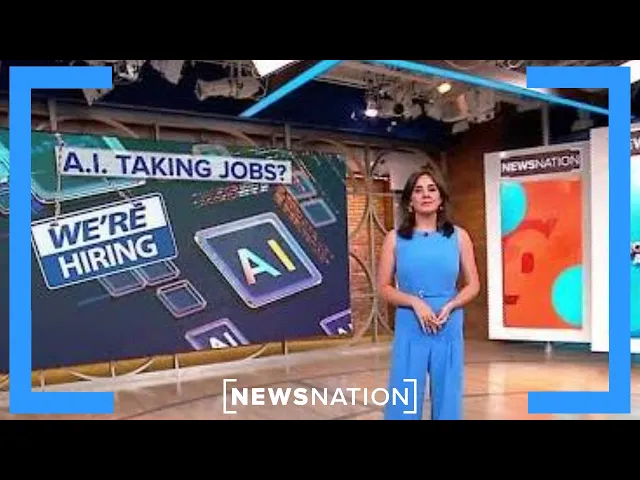AI disrupting entry-level job market for college graduates: Report

AI challenges college grads' job prospects
The traditional path from college to career is undergoing a seismic shift as artificial intelligence rapidly transforms the entry-level job market. A recent segment from "Morning in America" highlighted how AI tools are now capable of performing many tasks that once served as stepping stones for recent graduates. This technological disruption is forcing young professionals to reconsider their career strategies while raising important questions about the future of work.
Key insights from the report:
-
Entry-level positions are particularly vulnerable to AI replacement, especially in fields like marketing, content creation, and basic data analysis—areas that traditionally welcomed college graduates.
-
The technology is advancing faster than many predicted, with AI now capable of handling tasks that until recently seemed to require human judgment and creativity.
-
Employers are increasingly deploying AI solutions to reduce costs and increase efficiency, potentially limiting opportunities for those seeking to enter the workforce.
-
Educational institutions are struggling to adapt curricula quickly enough to prepare students for a rapidly evolving job market where technical skills and AI literacy are increasingly essential.
Why this matters now
The most compelling aspect of this development is the unprecedented speed at which AI is transforming professional entry points. Unlike previous technological revolutions that primarily affected manufacturing or repetitive tasks, today's AI systems are targeting knowledge work—the very domain where college graduates expected to find their footing.
This shift represents a fundamental restructuring of career ladders across industries. Traditionally, entry-level positions served a dual purpose: providing organizations with affordable labor while offering graduates invaluable experience and mentorship. As AI assumes these roles, we face a critical question: How will the next generation of professionals gain the experience necessary to advance if the bottom rungs of the career ladder are increasingly automated?
Beyond the headlines: What the report missed
The rise of "AI-adjacent" roles
While some entry-level positions are disappearing, we're simultaneously seeing the emergence of new roles centered around AI implementation, oversight, and enhancement. These positions—such as prompt engineers, AI ethics specialists, and human-in-the-loop monitors—require a blend of technical understanding and distinctly human skills like critical thinking and ethical judgment. Forward-thinking universities are already developing specialized programs to prepare students for these emerging opportunities.
The regional disparity factor
The impact of AI on
Recent Videos
How To Earn MONEY With Images (No Bullsh*t)
Smart earnings from your image collection In today's digital economy, passive income streams have become increasingly accessible to creators with various skill sets. A recent YouTube video cuts through the hype to explore legitimate ways photographers, designers, and even casual smartphone users can monetize their image collections. The strategies outlined don't rely on unrealistic promises or complicated schemes—instead, they focus on established marketplaces with proven revenue potential for image creators. Key Points Stock photography platforms like Shutterstock, Adobe Stock, and Getty Images remain viable income sources when you understand their specific requirements and optimize your submissions accordingly. Specialized marketplaces focusing...
Oct 3, 2025New SHAPE SHIFTING AI Robot Is Freaking People Out
Liquid robots will change everything In the quiet labs of Carnegie Mellon University, scientists have created something that feels plucked from science fiction—a magnetic slime robot that can transform between liquid and solid states, slipping through tight spaces before reassembling on the other side. This technology, showcased in a recent YouTube video, represents a significant leap beyond traditional robotics into a realm where machines mimic not just animal movements, but their fundamental physical properties. While the internet might be buzzing with dystopian concerns about "shape-shifting terminators," the reality offers far more promising applications that could revolutionize medicine, rescue operations, and...
Oct 3, 2025How To Do Homeless AI Tiktok Trend (Tiktok Homeless AI Tutorial)
AI homeless trend raises ethical concerns In an era where social media trends evolve faster than we can comprehend them, TikTok's "homeless AI" trend has sparked both creative engagement and serious ethical questions. The trend, which involves using AI to transform ordinary photos into images depicting homelessness, has rapidly gained traction across the platform, with creators eagerly jumping on board to showcase their digital transformations. While the technical process is relatively straightforward, the implications of digitally "becoming homeless" for entertainment deserve careful consideration. The video tutorial provides a step-by-step guide on creating these AI-generated images, explaining how users can transform...
